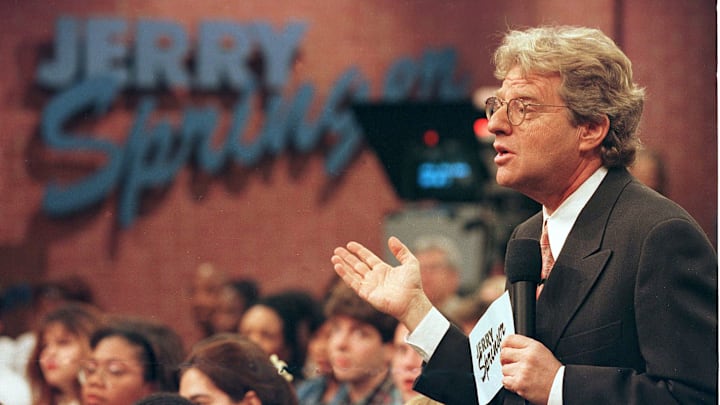Daytime talk shows reached a pinnacle during the late 1990s—though the label is a bit of a misnomer. The stations that paid licensing fees to transit these shows could broadcast them whenever they wanted, so much of “daytime” talk viewing happened at night when episodes were re-aired. But the term stuck and is useful for categorization.
These shows have a few commonalities that separate them from late-night talk shows. Late-night talk shows—then hosted by David Letterman, Jay Leno, Arsenio Hall, and so on—featured comedic monologues, skits, conservations with movie stars, and performances by famous musicians. Daytime shows usually feature discussions between non-famous people and focus on controversial life circumstances. They rely heavily on audience questions and feature hotlines to screen for future guests.
While writing my new book 1999: The Year Low Culture Conquered America and Kickstarted Our Bizarre Times, these were the most interesting facts that I came across.
- Jerry Springer was the first show recorded on TiVo.
- A segment on The Jenny Jones Show led to one guest murdering another.
- The talk genre had its own highlight show.
- Oprah won a free speech case against cattlemen.
- Donahue wanted to air a live execution but was denied.
- Jerry Springer: Too Hot for TV! became the bestselling mail order VHS.
- Maury Povich did his first paternity test.
Jerry Springer was the first show recorded on TiVo.

Launched in 1999, TiVo would revolutionize media access and on-demand viewing, providing a glimpse of how we binge digital video today. Before the product became a household name, its inventors tested out the recording device on some of the most popular shows of the era. Jerry Springer was the first show recorded with the new technology. A TiVo executive defended the choice as pragmatic, stating, “Hey, that’s what was on.”
A segment on The Jenny Jones Show led to one guest murdering another.

During a 1995 Jenny Jones Show taping, Jonathan Schmitz found out that his secret admirer was another man named Scott Amedure. Because most secret crush episodes featured heterosexual pairings, and only a fourth of Americans supported gay marriage at the time, the crowd yucked it up over Amedure’s attraction to Schmitz.
Three days after the taping, Amedure left Schmitz a suggestive handwritten note as a joke—but Schmitz didn’t find it funny. He approached Amedure at his trailer, pulled out a shotgun, and killed him. Schmitz was found guilty of murder and sent to prison. The Amedure family sued Jenny Jones and won in court before the verdict was overturned on appeal. The trial was aired on Court TV and covered by CNN. Both networks shared a parent company with Jenny Jones.
The talk genre had its own highlight show.

Talk was such a force in the ’90s that E! created Talk Soup to recap each day’s top talk, showing segments the way SportsCenter rehashes NBA and NFL highlights. Talk Soup led to a broader pop culture recap show called The Soup, which ran for 600 episodes.
Oprah won a free speech case against cattlemen.

A 1996 segment about mad cow disease on Oprah’s eponymous show landed the host in hot water. A group of ranchers sued Oprah and her producers for disparaging their business. After Oprah beat the lawsuit, she told reporters outside the courthouse, “Free speech not only lives. It rocks!”
Donahue wanted to air a live execution but was denied.

While Jerry Springer, Ricki Lake, and Richard Bey represented the trashier side of daytime talk shows, Phil Donahue was generally portrayed in the press as a crusading statesman of the genre who exuded respectability.
One of the wilder things Donahue advocated for was airing an execution in 1994, but courts prevented the broadcast of the execution. The same year Donahue pushed for airing death on his show, NBC produced Witness to the Execution, a fictional account about a TV network broadcasting the execution of an inmate. The movie’s tagline was “the only difference between life and entertainment is the bottom line.”
Jerry Springer: Too Hot for TV! became the bestselling mail order VHS.

After the home video company Real Entertainment experienced a commercial bonanza by using direct-response marketing to sell Cops outtakes, the company searched for another intellectual property to milk. They chose Jerry Springer.
A 1998 report stated that Too Hot for TV! “sold some 20,000 copies a week since its release last fall, becoming the fastest-selling TV title in the history of home video.” By the end of that year, 2 million tapes were sold. Just as Hormel Foods profited from waste by rebranding scrap meat as Spam, Springer took clips from the cutting-room floor and built a profitable home video business.
Maury Povich did his first paternity test.

The phrase you are not the father has become a talk show staple. Maury’s first paternity announcement happened in 1998. Back then, results took a week to come in. The success of the format led Povich to launch a line of at-home paternity tests in 2023, though the product’s website (theresultsarein.com) appears inactive.
Read More About Television:
